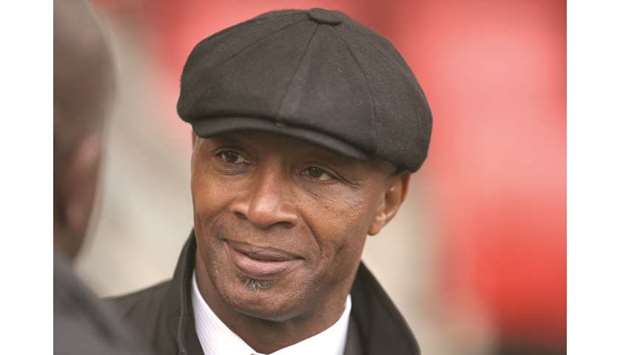English football reacted with grief and praise yesterday to the news that former West Bromwich Albion and England forward Cyrille Regis, a trailblazer for black players, had died aged 59. British media reported yesterday that Regis suffered a heart attack on Sunday.
Regis played five times for England between 1982 and 1987 was one of the stars of the West Brom team between 1977 and 1984 alongside two other back players, Laurie Cunningham and Brendon Batson. The trio faced frequent racist abuse from opposing fans throughout their careers. “He was more than just a footballer, he blazed a trail for every black player who followed him, an inspiration to myself and many players of my era. A humble man and a great man,” tweeted Mark Bright, a striker who made his league debut three years after Regis and is now a coach at Premier League side Crystal Palace.
Regis, a swashbuckling striker, scored 112 goals in 297 appearances for Albion before moving on to Coventry, winning the FA Cup in 1987. He also played for Aston Villa and Wolves. He retired in 1996 having made 614 senior club appearances and scored 158 goals. His widow Julia called her late husband a “role model” and “a very precious treasure.”
Regis was born in French Guiana in February 1958 but moved to London with his family at the age of five. He was spotted playing Sunday morning football in Regent’s Park in London by the chairman of a non-league club. He trained as an electrician and was playing for Hayes in non-league football when he attracted the attention of top clubs and was bought by West Brom for £5,000 in 1977. “He came into football the hard way and never lost his passion for the game,” his wife said. “He was a role model for so many because he always treated everyone he met with kindness and respect.”
Regis scored twice on his debut for West Brom in a League Cup victory against Rotherham in August 1977 and scored again on his league debut three days later. He was named the Professional Footballers’ Association’s Young Player of the Year for 1978.
At a time when the only other black player appearing regularly in the English top flight was Viv Anderson at Nottingham Forest, Regis, thrilling winger Cunningham, and Batson, an elegant defender, were a novelty in English football.
They were nicknamed the “Three Degrees” by manager Ron Atkinson and embraced the joke, posing with the popular American singing trio, with the women wearing West Brom shirts and the players matching fur coats. Regis became the third black player picked for England, after Anderson and Cunningham, when he won his first cap in 1982. “They did so much for the game and so much for the cause of black footballers,” British broadcaster and West Brom fan Adrian Chiles recalled.
“In later years I was privileged to get to know him as a friend and he just didn’t carry anger with him from that time,” he said. “Ian Wright, a later generation of black players, said ‘we were like Malcolm X... but Cyrille was like Martin Luther King’ — Cyrille was always turning the other cheek.”
Regis left West Brom for Coventry for £250,000 in 1984 and was part of the team which lifted the FA Cup three years later.
“He was a majestic player on the ball, he had great vision, good touch and strength and pace, unbelievable pace off the mark,” John Sillett, who managed Coventry to their FA Cup victory, said. On the West Brom website, chairman John Williams called Regis “a crusader against bigotry. A wonderful, wonderful player who had everything.” After retiring, Regis spent four years as a coach at West Brom and then worked as an agent. He was awarded an MBE in 2008.

Cyrille Regis
